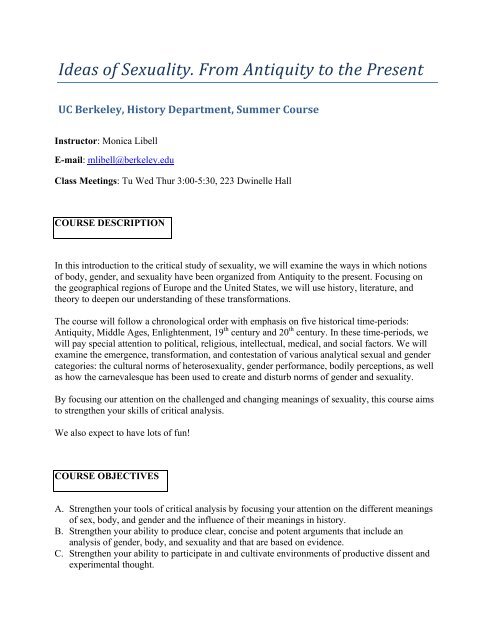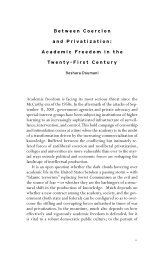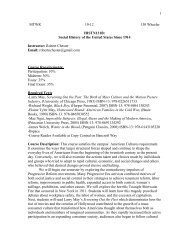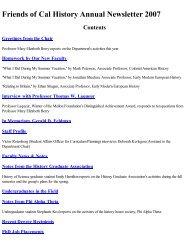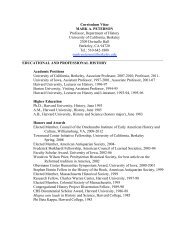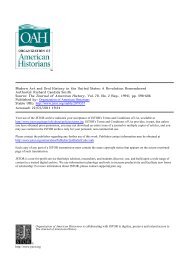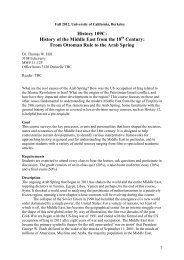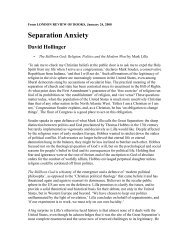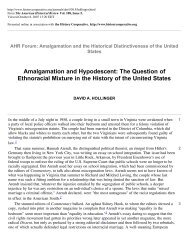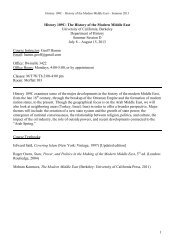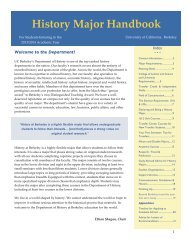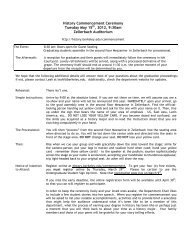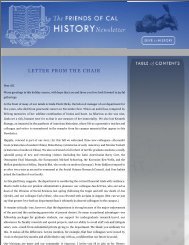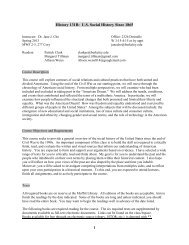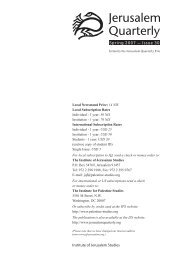Ideas of Sexuality. From Antiquity to the Present - Department of ...
Ideas of Sexuality. From Antiquity to the Present - Department of ...
Ideas of Sexuality. From Antiquity to the Present - Department of ...
You also want an ePaper? Increase the reach of your titles
YUMPU automatically turns print PDFs into web optimized ePapers that Google loves.
<strong>Ideas</strong> <strong>of</strong> <strong>Sexuality</strong>. <strong>From</strong> <strong>Antiquity</strong> <strong>to</strong> <strong>the</strong> <strong>Present</strong> <br />
UC Berkeley, His<strong>to</strong>ry <strong>Department</strong>, Summer Course <br />
Instruc<strong>to</strong>r: Monica Libell<br />
E-mail: mlibell@berkeley.edu<br />
Class Meetings: Tu Wed Thur 3:00-5:30, 223 Dwinelle Hall<br />
COURSE DESCRIPTION<br />
In this introduction <strong>to</strong> <strong>the</strong> critical study <strong>of</strong> sexuality, we will examine <strong>the</strong> ways in which notions<br />
<strong>of</strong> body, gender, and sexuality have been organized from <strong>Antiquity</strong> <strong>to</strong> <strong>the</strong> present. Focusing on<br />
<strong>the</strong> geographical regions <strong>of</strong> Europe and <strong>the</strong> United States, we will use his<strong>to</strong>ry, literature, and<br />
<strong>the</strong>ory <strong>to</strong> deepen our understanding <strong>of</strong> <strong>the</strong>se transformations.<br />
The course will follow a chronological order with emphasis on five his<strong>to</strong>rical time-periods:<br />
<strong>Antiquity</strong>, Middle Ages, Enlightenment, 19 th century and 20 th century. In <strong>the</strong>se time-periods, we<br />
will pay special attention <strong>to</strong> political, religious, intellectual, medical, and social fac<strong>to</strong>rs. We will<br />
examine <strong>the</strong> emergence, transformation, and contestation <strong>of</strong> various analytical sexual and gender<br />
categories: <strong>the</strong> cultural norms <strong>of</strong> heterosexuality, gender performance, bodily perceptions, as well<br />
as how <strong>the</strong> carnevalesque has been used <strong>to</strong> create and disturb norms <strong>of</strong> gender and sexuality.<br />
By focusing our attention on <strong>the</strong> challenged and changing meanings <strong>of</strong> sexuality, this course aims<br />
<strong>to</strong> streng<strong>the</strong>n your skills <strong>of</strong> critical analysis.<br />
We also expect <strong>to</strong> have lots <strong>of</strong> fun!<br />
COURSE OBJECTIVES<br />
A. Streng<strong>the</strong>n your <strong>to</strong>ols <strong>of</strong> critical analysis by focusing your attention on <strong>the</strong> different meanings<br />
<strong>of</strong> sex, body, and gender and <strong>the</strong> influence <strong>of</strong> <strong>the</strong>ir meanings in his<strong>to</strong>ry.<br />
B. Streng<strong>the</strong>n your ability <strong>to</strong> produce clear, concise and potent arguments that include an<br />
analysis <strong>of</strong> gender, body, and sexuality and that are based on evidence.<br />
C. Streng<strong>the</strong>n your ability <strong>to</strong> participate in and cultivate environments <strong>of</strong> productive dissent and<br />
experimental thought.
D. Develop a deeper understanding <strong>of</strong> <strong>the</strong> distinctive constructions <strong>of</strong> sexuality, body, and gender<br />
in various his<strong>to</strong>rical and cultural contexts and how those constructions transform his<strong>to</strong>ry,<br />
culture, and relations <strong>of</strong> power.<br />
E. Develop skills <strong>to</strong> critically analyze primary sources.<br />
REQUIRED READINGS<br />
Anna Clark: Desire: A His<strong>to</strong>ry <strong>of</strong> European <strong>Sexuality</strong>, Routledge, 2008<br />
Robert C. Solomon & Kathleen M. Higgins: The Philosophy <strong>of</strong> (Erotic) Love, Prome<strong>the</strong>us Books<br />
fourth edition, 2009<br />
Please order <strong>the</strong> books well ahead <strong>of</strong> <strong>the</strong> course, so that you have <strong>the</strong>m at <strong>the</strong> start <strong>of</strong> <strong>the</strong> first<br />
class.<br />
COURSE ASSIGNMENTS & RANGE OF WEIGHTS<br />
The maximum number <strong>of</strong> points for <strong>the</strong> course is 100.<br />
1. Three class preparation responses (CPR) @10 p each max 30 p<br />
2. Critical review <strong>of</strong> a primary source max 20 p<br />
3. Final in-class exam max 30 p<br />
4. Active participation max 20 p<br />
A = 90% B = 80% C = 70% D = 60% F < 60%<br />
PARTICIPATION<br />
Class discussion is essential <strong>to</strong> this course. I will circulate a sign-in sheet at <strong>the</strong> beginning <strong>of</strong> each<br />
class and any student who does not sign <strong>the</strong> sheet, or arrives after <strong>the</strong> circulation is complete,<br />
will be considered absent. I expect that you will actively participate in <strong>the</strong> conversations and be<br />
prepared for every class meeting by carefully reading and reflecting on <strong>the</strong> material. I expect that<br />
you will challenge <strong>the</strong> viewpoints <strong>of</strong> <strong>the</strong> authors and students in <strong>the</strong> class, but you must do so in a
espectful manner. Since some <strong>of</strong> <strong>the</strong> issues might be personally sensitive, please moni<strong>to</strong>r how<br />
you express your point <strong>of</strong> views. You must also be willing <strong>to</strong> listen <strong>to</strong> o<strong>the</strong>r’s points without<br />
taking it personally. The focus should always be on <strong>the</strong> effectiveness <strong>of</strong> <strong>the</strong> arguments. Here are<br />
<strong>the</strong> general criteria for your class participation grade:<br />
A =<br />
B =<br />
C =<br />
D =<br />
F =<br />
Always prepared and attentive during class, which translates in<strong>to</strong> relevant contributions<br />
<strong>to</strong> class discussions, yet not dominating. Often gives accurate statements about <strong>the</strong><br />
material and asks probing questions.<br />
Usually prepared and attentive during class. Contributes <strong>to</strong> class discussion but not<br />
consistently. Typically gives accurate observations about <strong>the</strong> material and occasionally<br />
asks probing questions.<br />
Somewhat prepared and sometimes inattentive in class. Only occasionally responds <strong>to</strong><br />
questions and unwilling <strong>to</strong> <strong>of</strong>fer opinions. Often quiet during class discussions.<br />
Often unprepared and inattentive in class. Unable <strong>to</strong> respond relevantly when asked a<br />
question. May interrupt and derail class discussions.<br />
Not attending class or seriously derails or interrupts discussions.<br />
CRITERIA FOR CLASS PREPARATION RESPONSES, (CPRs), PRIMARY<br />
SOURCE REVIEW, AND FINAL EXAM<br />
During <strong>the</strong> course, you will need <strong>to</strong> prepare three short papers (CPR). I will give you a few<br />
questions <strong>to</strong> answer on <strong>the</strong> reading or readings for <strong>the</strong> next day. The questions usually involve<br />
comparisons, interpretations and/or argumentation. Your typed responses must be concise yet<br />
sufficiently explained and will be no more than four pages, double-spaced. The purposes <strong>of</strong> <strong>the</strong>se<br />
responses are <strong>to</strong> motivate you <strong>to</strong> read more carefully, <strong>to</strong> focus your attention on some <strong>of</strong> <strong>the</strong><br />
essential ideas <strong>of</strong> <strong>the</strong> reading, and <strong>to</strong> improve our class discussions. Reading responses cannot be<br />
made up unless <strong>the</strong>re is a compelling excuse. If you miss class, it is your responsibility <strong>to</strong> keep<br />
track <strong>of</strong> when <strong>the</strong> class preparation responses are due.<br />
You will be asked <strong>to</strong> review a primary source. Although you may choose your own source it will<br />
have <strong>to</strong> be approved by me. The source is expected <strong>to</strong> be about 5-10 pages and you will receive<br />
fur<strong>the</strong>r instructions down <strong>the</strong> road on how <strong>to</strong> write an effective review. With minor<br />
modifications, <strong>the</strong> criteria for <strong>the</strong> review will be <strong>the</strong> same as for <strong>the</strong> CPRs and exam.
Please note that all CPRs and <strong>the</strong> review are <strong>to</strong> be submitted electronically. I will not accept<br />
hard-copies.<br />
The final exam will consist <strong>of</strong> five short questions (3 pts each) and two essay questions (7.5 pts<br />
each) with a maximum <strong>of</strong> 30 points. Here are <strong>the</strong> general criteria for your class preparation<br />
response grade and for <strong>the</strong> final exam:<br />
A: A factually correct answer that also very effectively argues for a specific interpretation or<br />
why a comparison or development <strong>of</strong> a practice, idea, etc can be unders<strong>to</strong>od in a certain way.<br />
The answer discusses important perspectives and shows engagement with or deliberation on an<br />
issue, beyond what is simply stated in <strong>the</strong> readings or on <strong>the</strong> lecture slides.<br />
B. Same as above. Except for minor mistakes, <strong>the</strong> facts are correct. The argumentation is<br />
thoughtful but somewhat less complete, coherent, or persuasive.<br />
C. An adequate knowledge <strong>of</strong> <strong>the</strong> material is demonstrated along with fair but basic<br />
argumentation <strong>of</strong> <strong>the</strong> issues involved.<br />
D. Inadequate knowledge and understanding <strong>of</strong> <strong>the</strong> material. May include weak argumentation.<br />
F. Seriously inadequate or wrong answer, cheating (<strong>to</strong> which I include plagiarism).<br />
CLASSROOM PROCEDURES AND MANNERS<br />
1. Class begins on time. Make sure you arrive in time.<br />
2. You will find yourself becoming excited about <strong>the</strong> new concepts and activities in this<br />
course and you will want <strong>to</strong> add your opinion <strong>to</strong> <strong>the</strong> discussions and participate actively.<br />
Communication with <strong>the</strong> entire class is expected and participation is encouraged.<br />
Inappropriate chatting during class, however, is not acceptable because it is impolite <strong>to</strong><br />
those who have <strong>the</strong> floor and is disruptive.<br />
3. Consistent disruptions <strong>of</strong> class - this includes frequent tardiness - will result in failing<br />
grades. You may not use cell phones, personal computers or any personal electronic<br />
device during class unless it is a specified component in <strong>the</strong> instructional process. All<br />
devices must be turned <strong>of</strong>f and placed inside <strong>of</strong> your bag out <strong>of</strong> view during class. If you<br />
must have a cell phone on for an emergency purpose it is your responsibility <strong>to</strong> notify <strong>the</strong><br />
instruc<strong>to</strong>r prior <strong>to</strong> class.<br />
4. You will frequently be asked <strong>to</strong> participate in classroom activities, or <strong>to</strong> discuss some<br />
issues with your classmates in small groups. These activities will help you become<br />
involved in <strong>the</strong> course and will provide you with food-for-thought for your preparation<br />
response papers. I am sure that you will find <strong>the</strong>se activities helpful.<br />
5. Emergencies occasionally take place in a person’s life. If you have <strong>to</strong> miss a class, be<br />
sure <strong>to</strong> e-mail me promptly.
6. You are expected <strong>to</strong> follow UC Berkeley’s rules <strong>of</strong> conduct, show consideration for<br />
o<strong>the</strong>rs, demonstrate integrity in your academic work and participate with enthusiasm.<br />
MY TEACHING STYLE<br />
The course is lecture-based, interspersed with seminar-style discussions. The reading material<br />
has been carefully chosen <strong>to</strong> fit your level <strong>of</strong> understanding. You are <strong>the</strong>refore expected <strong>to</strong> have<br />
read, unders<strong>to</strong>od, and reflected upon <strong>the</strong> reading material before class. In my role as instruc<strong>to</strong>r, I<br />
will provide you with background information <strong>to</strong> <strong>the</strong> readings, make connections, clarify difficult<br />
concepts and ideas. I will not summarize <strong>the</strong> texts, since this is part <strong>of</strong> your job. However, if you<br />
do feel that you have trouble understanding any section, let me know and we will work through it<br />
<strong>to</strong>ge<strong>the</strong>r.<br />
ATTENDANCE POLICY<br />
I expect you <strong>to</strong> attend all classes and <strong>to</strong> be on time, but <strong>the</strong>re is no penalty for two unexcused<br />
absences; however, each unexcused absence <strong>the</strong>reafter will reduce your final course grade by<br />
one-third <strong>of</strong> a grade. For example, if you miss three days <strong>of</strong> class without a valid excuse, your<br />
final grade for <strong>the</strong> course will be lowered by one-third <strong>of</strong> a grade (i.e., from a “B+” <strong>to</strong> a “B”).<br />
Excused absences are legitimate, such as illness, family emergencies, etc. You must contact me<br />
as soon as possible if you miss class.<br />
LATE WORK POLICY<br />
Unless you have a compelling reason, late work will be penalized one-third <strong>of</strong> a grade per day<br />
(e.g., a ‘B’ becomes a ‘B-’). You must talk <strong>to</strong> me as soon as possible if you are unable <strong>to</strong><br />
complete your work on time.<br />
COURSE SCHEDULE July 2 – Aug 10<br />
WEEK 1: ANTIQUITY
July 3<br />
July 4<br />
July 5<br />
Introduction <strong>to</strong> course<br />
No Class!<br />
Body, gender, and sex in ancient Greece and Rome<br />
WEEK 2: THE MIDDEL AGES AND EARLY MODERN TIMES<br />
July 10 To penetrate or <strong>to</strong> be penetrated?<br />
July 11 Marriage and reproduction<br />
July 12 ‘Sexotism’ – Colonialism and sex<br />
WEEK 3: THE ENLIGHTENMENT<br />
July 17 The ‘two’ sexes. Medicalization <strong>of</strong> <strong>the</strong> body. (CPR #1 due)<br />
July 18 Pornography and politics<br />
July 19 Philosophy in <strong>the</strong> bedroom; Marquis de Sade on sex, violence, and death.<br />
WEEK 4: 19 th CENTURY<br />
July 24 Desires and ‘Vic<strong>to</strong>rian’ ideals in Europe and <strong>the</strong> US (CPR #2 due)<br />
July 25 Medical classifications <strong>of</strong> sexual behavior, norms and deviations<br />
July 26 Race, class, and sex<br />
WEEK 5: 20 th CENTURY TO THE PRESENT<br />
July 31 The welfare state and sexual education (CPR #3 due)<br />
Aug 1 Devices, Internet and, <strong>the</strong> pursuit <strong>of</strong> satisfaction<br />
Aug 2 Sex and identity meet subversion and playfulness<br />
Week 6: CONTEMPORARY ISSUES<br />
Aug 7 How sexually knowledgeable and liberated are we? (Review due)<br />
Aug 8 No class<br />
Aug 9 Final in-class exam and course evaluations


